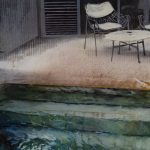Through a range of carefully selected works from artists around the world, the exhibition forms a dialogue between the different practices and materials used by each artist. The works are linked by a common theme: the pool. The pool’s influence throughout these artists’ bodies of work is palpable. Whether intentionally or coincidentally, the depiction of a pool has long stood as a symbol of luxury and leisure, a mark of indulgence.
The Swimming Pool brings together the works of these artists to explore the swimming pool as a theme of exuberance, rest, awakening and more. The show features work by the gallery’s artists Olaf Breuning, Gil Heitor Cortesāo, and Philip Mueller along with works by emerging and established artists Nazgol Ansarinia, Tamara Al Samerraei, Maria Bußmann, Alexei Alexander Izmaylov, and Sultan Al Remeithi.
Gil Heitor Cortesāo takes mundane imagery and gives it a nostalgic essence by creating his works using oil on transparent Plexiglas. With textural brushstrokes and painterly narratives, Cortesāo offers his viewers visual disjunctions. The pool, a recurring theme in Cortesāo’s private home landscapes – which have been appropriated from iconic architectures of the 60’s and 70’s – emanates a certain calmness through his use of a muted palette and depiction of serene environments.
Many scenes in Philip Mueller’s invented locale are accompanied by the vision of a pool. Some full and others empty, it remains for the artist that the pool symbolizes rest, rejuvenation, and decadence. The members of his imagined hedonist gang, the Black Flamingo Sad Boys, have found refuge in the pools of Tiberio Beach Resort, a geographically changing place, which occupies Mueller’s mind and is inspired by the gang’s journey to the end of the world.
With a crafty, over-simplified approach, the works of Olaf Breuning explore the more literal impact of man-made luxuries on the environment. Using woodcut depictions of the natural world, Breuning creates a distressing contrast of the harsh realities of climate change created by the ever-evolving human civilization.
Dominated by architectural components, minimalism, and observation, Nazgol Ansarinia’s work is a striking comment on urbanity and mass consumerism. In Tehran, where the artist is from, it is not uncommon to witness the gentrification of the city, where traditional buildings and structures get demolished to make way for the new. These works are a statement on the intertwining of personal experiences with the larger social context.
Oscillating between, and often mixing the principals of, a myriad of materials, such as painting, photography, video, and installation, Tamara Al Samerraei’s personal and intimate works depict objects that are stripped down to their bare essence. Emanating an intense, quintessential psychological charge throughout the visceral rawness of the canvas, the artist uses rich, obscure pigments that envelope the composition, with fiery bright details that draw the viewer’s attention around the opus.
Maria Bußmann’s works occupy the sensuality of a dream state — fantastical imagery caught in the wind of thought. Small yet mighty depictions of different landscapes and characters inhabit Bußmann’s compositions created in tiny tins and draw on themes of philosophy and literature.
Alexei Alexander Izmaylov investigates ideas of dreams and escapism with his playful, miniature set-like installations that evoke a sense of naïveté. Using toys, wooden blocks, and cutouts, the artist photographs these compositions on the now obsolete medium: Fujifilm instant peel-apart film.
With a practice bound by color, personal experience, experimentation, and documentation, Sultan Al Remeithi’s work emits a certain comfort in depicting the known. Based off Polaroid pictures the artist took of his confinement space during quarantine, Al Remeithi finds beauty and life in things that may otherwise seem trite.
In reflecting on the swimming pool as an icon of modernism and social status, we can see the suburban desire to own a backyard watering hole. A pool is water made available and useful through its domestication. A pool is making invisible water visible by painting its container blue.
Press release from Carbon 12



